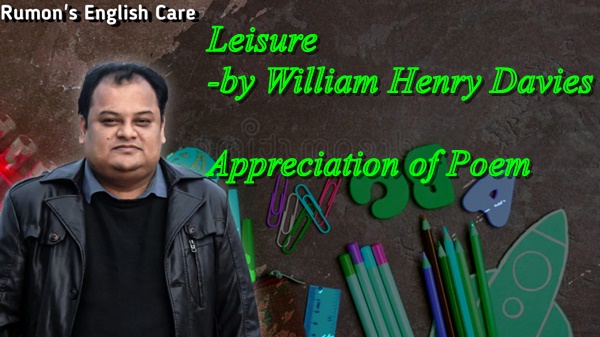Leisure -by William Henry Davies
Leisure
– by William Henry Davies
What is this life if, full of care,
We have no time to stand and stare.
No time to stand beneath the boughs
And stare as long as sheep or cows.
No time to see, when woods we pass,
Where squirrels hide their nuts in grass.
No time to see, in broad daylight,
Streams full of stars, like skies at night.
No time to turn at Beauty’s glance,
And watch her feet, how they can dance.
No time to wait till her mouth can
Enrich that smile her eyes began.
A poor life this is if, full of care,
We have no time to stand and stare
Bengali Translation:
এই কি প্রত্যাশিত জীবন, কেবলই কর্মময়,
আনন্দ উপভোগের নেই একটুকু সময়।
অবসর কই দাঁড়িয়ে দেখার আদিম মহাদ্রুম,
পরিতৃপ্ত তৃণ-ভোজিরা কাড়েনা আমার ঘুম।
কাঠবেডালী লুকোয় বাদাম, ঘন গাছের আড়ালে,
বন-জঙ্গল পেরই আমি আপন কাজের খেয়ালে।
দেখার সময় কোথায় আমার, নদীভরা তারার ভীড়,
দিনেই তারা চমক লাগায়, রাতের আকাশ যাদের নীড়।
নৃত্যরতা সুন্দরীকেও দেখিনা আমি চোখ চেয়ে,
মনোরম সেই দৃশ্য ফেলে, চলি আমি পথ বেয়ে।
উজ্জল চোখের হাসির আমেজ ছড়িয়ে পড়ে মুখের ‘পর,
নেই যে আমার দেখার সময়, কত যে কাজ জীবন ভর।
নি:স্ব এই জীবনটুকু কি আছে আর তাহা বই,
নেই অবকাশ, আনন্দ নেই, উপভোগ ! তার সময় কই ?
(i) What is the poem about?
(ii) What is the poem’s message?
(iii) What is the mood of the poem?
(iv) What is the title of the poem?
(v) What is the phrase repeated throughout the poem?
(vi) What is the poet referring to when he uses the word “Beauty”?
Answer:
(i) The poem is about the importance of finding time to appreciate nature and the simple pleasures in life. The speaker argues that a life without leisure is meaningless, and that people are too busy and stressed to enjoy the natural world.
(ii) The poem’s message is that true happiness comes from appreciating nature, not material things.
(iii) The poem has a reflective and thoughtful mood.
(iv)The poem is titled “Leisure” to emphasize the importance of finding time to enjoy natural beauty despite life’s responsibilities.
(v) The phrase “no time” is repeated throughout the poem.
(vi) The poet is referring to nature.
(vii)The line “Where squirrels hide their nuts in grass” demonstrates interaction with nature.
Extra:
i. What is the meaning of the word ‘leisure’?
Answer: ‘Leisure’ means free time that is spent doing what we enjoy when we are not working or studying. It drives us pleasure, relaxation, and other emotional satisfaction.
ii. What do you think the following phrases mean?
- full of care
- streams full of stars
- broad daylight
1. Answer: The phrase ‘full of care’ means life is full of worries and anxiety.2.
2. Answer: The phrase ‘streams full of stars’ means with the sunshine the water of the streams reflects and shines like that of the bright star of the night skies. It can also refer to the underneath pebbles of the transparent water of the stream which looks like the bright star of the night skies.
3. Answer: The phrase ‘broad daylight’ means the shinning of the sun with dazzling effect.
iii. Which stanza do you think is the most important?
Answer: The last stanza is the most important because it highlights the exact pathetic situation of our life. Our life is indeed a ‘poor life’ because it is full of worries and troubles and we have no time to relax, enjoy and appreciate the beauties of nature around us. We always run to fulfil our materialistic desires and have no peace in our mind.
iv. Which stanza do you like the best? Why?
Answer: The first stanza is the best because it gives us a self-realization that we are living a life which has no meaning. It is full of worries and anxiety. We have no time to stand and look at the beauties of nature and enjoy them at our own will.
v. In the fifth stanza, Beauty is mentioned with a capital B. Beauty is treated like a person. What does Beauty do like a person?
Answer: Beauty gives a beautiful glance, dances rhythmically with her enchanting feet and smiles that begins from her eyes and spreads to her lips.
vi. Answer the questions about these lines from the poem.
‘No time to wait till her mouth can
Enrich that smile her eyes began.’
Who or what is ‘her’ in these lines?
Answer: In the above extracted line Beauty is referred to as ‘her’. In these lines Beauty has been personified that is human qualities have been attributed to the beauties of nature.
vii. What should there be time for?
Answer: There should be time to stand, look and appreciate the beauties of nature that exists all around us.
What does the word ‘enrich’ mean?
Answer: The word ‘enrich’ means to intensify or improve the quality of something. –

